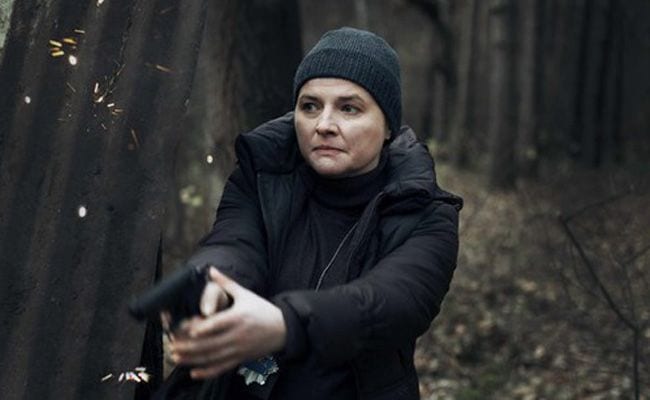In Michał Otłowski’s Waterline (Jeziorak), Jowita Budnik plays Iza Deren, a no-nonsense policewoman who’s investigating a girl’s death. The decidedly put-upon Iza has more than this case on her plate, unfortunately.
She’s pregnant, for one, and the father of the twins she’s expecting has disappeared under mysterious circumstances with another police colleague. Meanwhile, the investigation turns up some long-buried secrets from Iza’s own past.
Otłowski’s film, his feature debut, is a crisp, enjoyable thriller with a well-sustained brooding atmosphere. In tone and tempo, the movie is rather reminiscent of the Scandi thrillers that have found favour on TV in recent years, a comparison that, in a sense, highlights one of the film’s problems.
There’s so much in the way of plot here, and so much in the way of interesting back-story for Iza, that the material ends up feeling somewhat compressed at just 90 minutes. A mini-series format may have been better suited to the web of narrative strands that Otłowski is weaving here.
Still, the movie benefits greatly from a subtle and carefully modulated performance by Budnik, and its stylistic confidence marks Otłowski out as a filmmaker to watch.

Gods (2014)
A fine central performance is also one of the saving graces of Lukasz Palkowski’s Gods (Bogowie), an audience favourite, which won several prizes at last night’s “non-statutory” ceremony that precedes the main awards tonight. Gods stars the popular Tomasz Kot as Zbigniew Religa, the surgeon who performed the first successful heart transplant in Poland.
Following Religa’s establishment of a Zabrze clinic dedicated to cardiac procedures, the film is interesting in its exploration of the kinds of opposition that the surgeon meets, opposition that’s deeply related to Poland’s religious and cultural landscape.
The film boasts some strong moments, such as a well-observed scene in which Religa tries to persuade the grieving parents of a young man killed in a motorcycle accident to allow their son’s heart to be donated. However, for me, the picture falters in its recourse to montage sequences (quite what James Brown’s “It’s a Man’s Man’s Man’s World” is scoring one of them for is anybody’s guess), some over-pitched moments, and uncertainties of tone.
The latter are nowhere more apparent than in a misguided scene (it has no follow-through) in which a male patient objects to the prospect of receiving the heart of “a faggot, a Jew, or, worse, a woman”, a comment that drew some giggles at the screening I attended.
Kot’s rumpled charisma does a lot to hold the movie together. However, the film is rather careless in its handling of other characters: as Religa’s wife, for example, Magdalena Czerwińska gets the very definition of a thankless role, while the brilliant Kinga Preiss (memorable in Smarzowski’s The Mighty Angel) is reduced to little more than a cameo. It’s a man’s world, indeed.

Close Ups (2014)
Despite some shortcomings, Waterline and Gods are pretty much masterpieces compared to Close Ups (Zbliżenia), a feeble maternal melodrama written and directed by Magdalena Piekorz. The film is not worth lingering over, except to note that it contains some of the most heavy-handed symbolism seen in many a year and never digs deeply enough into the claustrophobic mother/daughter relationship that it purports to explore.

Goto, Island of Love (1968)
It was a definite relief to head straight from Close Ups into Goto, Island of Love, Walerian Borowcyk’s superb 1968 fantasia which unfolds on an archipelago cut off from the rest of civilisation following an earthquake. Newly restored by Arrow Films (the restoration produced by Daniel Bird) the film looked a dream (appropriately enough), and mesmerised with its sheer bonkers beauty.
Following the spelling-it-out obviousness of Close Ups, Borowcyk’s enigmas were especially appreciated, and it’s fair to say that the screening resulted in another restoration: that of film faith itself.
* * *
Above: Waterline (2014)

